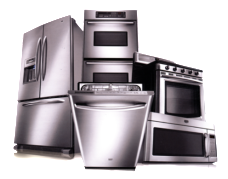
Appliances require proper wiring to ensure that ground-fault detection in an appliance runs correctly. In simplest terms, ground-fault detection is engineered in a circuit to ensure that the current going into the appliance is the same going out. Overheating and system malfunction can occur if the appliance is not wired correctly, which is why finding a certified electrician can ensure a long life and proper functioning of your appliance.
Electrical Requirements for Major Appliances
** Always check local electrical codes and the use/care manual for your appliance. **
110-120 volt AC circuits ( basics )….
- The polarity for the power wires is important. If the plug outlet is wired backwards…. things like spark modals in gas ranges can fail, you can receive a possible shock trying to simply replace a light bulb.
- Ground plug must never be broken off!! where a standard two-prong wall receptacle is encountered, it is the personal responsibility and obligation of the customer to have it replaced with a properly grounded three-prone wall receptacle. The ground is a safety in case of a short.
- If you have to use an extension cord, it is absolutely necessary that is be a UL/CSA listed 3 wire cord that the current carrying rating of the cord in amperes be equivalent to, or greater than, the branch circuit rating.
-
Low voltage can be a problem. Stall voltage for a 110-120 volt AC motor is 100 volts. If the voltage drops below 100 volts AC, the motor can/will fail and possibly damage the motor, in which case you may have to spend time finding
a repair technician. Too many things on one line can drop the line voltage below the stall point. - Most, if not all 110-120 volt appliances must be on a dedicated line. This means nothing else on the same line or plug. 220-240 volt AC ( basics )
- Most 220-240 volt circuits today are a 4 wire circuit. Red, power…black, power…white, neutral…green or bare, ground.
-
Older electric dryers had a 3 prong cord while newer dryers have a 4 prong cord.
…or have an electrician do this for you. - Wiring help for the 4 prone receptacle
- The ground is a safety in case of a short. The ground is also used for some “auto-sensor” circuits.
References
Appliance Aid: Common Electrical Requirements for Household Appliances